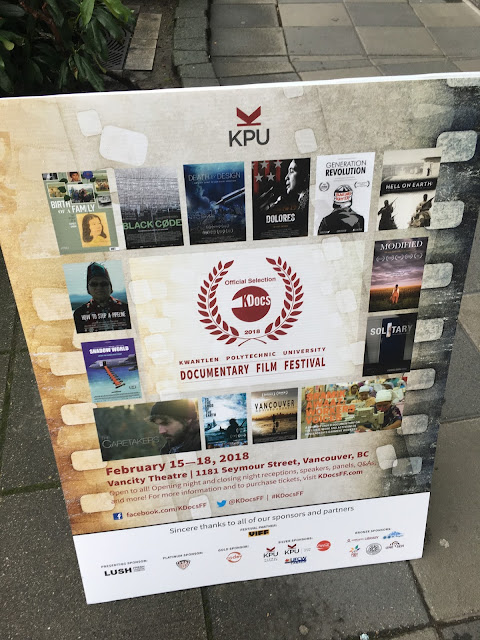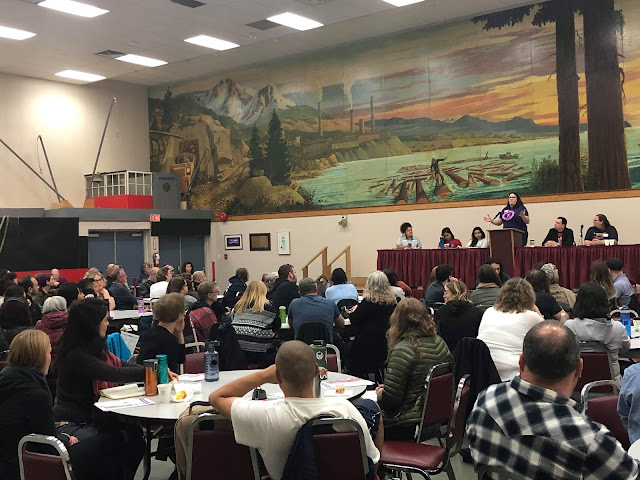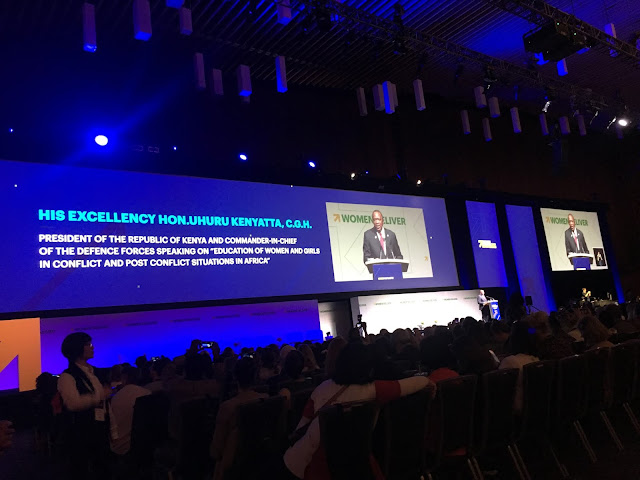KDocs 2018: Birth of a Family, Workers' Voices and Delores
I saw the line up of the KDocs Film Festival and knew I wanted to take in a few of these docs. For $5 a film, it was a great deal and access to films I normally wouldn't be able to see. So here's the lowdown on what I saw!
Birth of a Family - Directed by Tamara Hubbard
 Prior to the showing of the film we were treated to a mini lecture by Dr. Raven Sinclair, a social worker by trade and Associate Professor at the University of Regina, member of the Gordon Nation on Treaty 4 territory in Saskatchewan.
Prior to the showing of the film we were treated to a mini lecture by Dr. Raven Sinclair, a social worker by trade and Associate Professor at the University of Regina, member of the Gordon Nation on Treaty 4 territory in Saskatchewan. She gave us the context for the "Sixties Scoop," also known as "Indian child removal system." I will say it again - I'm always very grateful and humbled when indigenous people generously share their truth and experiences, no matter how difficult and painful their memories and stories are. She shared her history of being adopted out and then only was it when she went to university that it enabled her contextualize her experience in Canada and indigenous peoples.
 We went way back in time to colonial figures talking about white supremacy. Our history is dark. It's genocide and apartheid. Starting when the settlers landed in Canada they stole the land, and tried to kill off indigenous populations whether it was direct violence, or the elimination of their food systems (buffalo slaughters). "If you want to destroy a peoples, you destroy their commissary."
We went way back in time to colonial figures talking about white supremacy. Our history is dark. It's genocide and apartheid. Starting when the settlers landed in Canada they stole the land, and tried to kill off indigenous populations whether it was direct violence, or the elimination of their food systems (buffalo slaughters). "If you want to destroy a peoples, you destroy their commissary." The interpersonal, intercultural, and intergenerations traumas will take generations to repair and reconciliation will not happen until families have the time to work through their stuff.
 She ended her talk with some pretty startling states about indigenous children in Canada. The one that struck me the most was the between 1989 and 2012 indigenous kids spent 66 MILLION nights in foster care which equals about 180,000 years. How can you measure the loss of culture and language? How can we be ok with this? Indigenous families have been disrupted and decimated. As families move forward, they are making spiritual and physical reconnections with family and culture and that's what this film was about.
She ended her talk with some pretty startling states about indigenous children in Canada. The one that struck me the most was the between 1989 and 2012 indigenous kids spent 66 MILLION nights in foster care which equals about 180,000 years. How can you measure the loss of culture and language? How can we be ok with this? Indigenous families have been disrupted and decimated. As families move forward, they are making spiritual and physical reconnections with family and culture and that's what this film was about. Birth of a Family is about 4 siblings who meet for the first time together. They were all survivors of the "sixties scoop" where Indian children were taken away from their parent(s) and fostered or adopted out to white families. It's hard not to shed a tear or two as they show Betty Ann (producer of the film) meet each of her siblings at the Calgary Airport. One by one they arrive from BC, Alberta, and California. They get into a car and road trip to Banff to connect and spend a week with each other. There is a discussion about their native history as they meet and elder at the Buffalo Nations Museum. It was very moving to watch them connect to their heritage. They spend time talking about their families and childhoods. By the end of the film, it seems like they are excited to stay in touch and I wonder if they did.
 |
| Jules Koostachin, Raven Sinclair, April, Tamara Starblanket |
The Q&A was interesting. I learn so much at these events, anyway..I learned of the Splatsin Nation and how they are the only nation that has jurisdiction over their children which came from one weekend the government came in with buses and apprehended 100 fo their children, in a community of 300. They organized, caravanned to Victoria to the legislature to challenge the removal of their kids. They wrote a by-law and the government had a month to approve or deny it and it sat on someone's desk for too long therefore, the by-law passed.They also put the child tax benefits into trusts for their kids when they age out rather than absorbing the money into operating budgets and saying that it goes into programs and services.
They talked about ally work and it starts by learning. One of the panelists is a lawyer who looks at state violence and genocide at the root of all of this. That there needs to be a truthful discussion about residential schools and the sixties scoop as instruments of genocide not just things that have happened in our history.
Between the panel and the film, it was an excellent learning opportunity about the "sixties scoop."
Workers Voices - Chaumtoli Huq
Chaumtoli Huq, a lawyer and now filmmaker wanted to tell the stories of the women garment workers of Bangladesh. The main purpose of her film was to give these women a platform to tell their stories to animate conversations to re-energize the labour movement. Since the Rana Plaza tragedy in 2013, this would be an opportunity to get footage and interviews from directly from workers - there's been a disconnect between them and the human rights agencies that have been involved. The film took 2 years to make and focuses on 5 unions in Dhaka which cover the whole continuum of what makes up the political left. The context of their stories is to look at the "triple burden" of these women. They are workers, they are women and they are female organizers.
The film talks a lot about the low wages and the fact that these women have to work to put their kids through school, to put food on the table, have a place to live. Often their husbands are sick leaving all of the paid and unpaid work to the women to deal with. They were also honest about the abuse they endure not only at work, but at home. When it comes to them as trade unionists, it's clear. Women's unions are secondary to men's unions. Women's unions aren't as connected to the international labour movement but I think that is changing. These women were fierce with some of the strongest trade union principles I've ever seen. In order to change the world, it's important for every worker to assert and ensure their rights under their contracts.
Delores - Director - Peter Bratt
 I first heard of Delores Huerta when I went to the SIUW conference in Los Angeles in 2016. It was on the bus on way to the El Super job action in Inglewood when my seat mate gave me a little history lesson about Latinx organizers in East LA - Si se pede!! When I got home, I did a little more research and realized it was the same Delores that I had heard of in university when I was studying political science at UBC. In my third year US politics course I had professors who were staunch democrats and had marched with Cesar Chavez (and Delores) to Sacramento in the 1960s.
I first heard of Delores Huerta when I went to the SIUW conference in Los Angeles in 2016. It was on the bus on way to the El Super job action in Inglewood when my seat mate gave me a little history lesson about Latinx organizers in East LA - Si se pede!! When I got home, I did a little more research and realized it was the same Delores that I had heard of in university when I was studying political science at UBC. In my third year US politics course I had professors who were staunch democrats and had marched with Cesar Chavez (and Delores) to Sacramento in the 1960s. Pablo Godoy, UFCW National rep and activist for migrant workers' rights introduced this film about the (s)hero of farm workers' rights. The context for temporary foreign workers, who do a lot of the picking and processing of the food we eat in Canada, is dark. These workers are up against some of the worst labour practices in the country. They are denied the opportunity to unionize. They are denied access to healthcare or days off. They can be fired for getting pregnant. Some workers from Mexico have been blacklisted by the consulate because they asked about the labour rights. Pablo encouraged to think about all of the hands that touch our food by the time it hits our plates. Something can't be local if the labour that produces it, is exploited. It's not all doom and gloom - workers are taking action and I'm reminded of the successful boycott of Driscoll's that was led by the farm workers in Bellingham, where they successfully gained recognition as a union by their employer and bargained their first contract.
The film itself is incredible. Delores' story is amazing and so inspiring. It covered her full life as an organizer, mother, activist, negotiator, trade unionist. She was a genius - every tactic was strategic, part of the bigger plan, nothing isolated or impulsive. Her ability to see that the women's movement needed the farm workers movement and vice versa was brilliant. Her children were interviewed throughout the film, commenting on their mother's political acumen, challenges of having her in and out of their lives (she had 11 children in total). at 88 she is still a force to be reckoned with.
I highly recommend this film. Someone in the film said it best:
"Delores' legacy is of sustainability, none of us has the excuse to tap out."
Panel Discussion
After the film we were treated to a panel of workers' rights advocates. MLA Raj Chouhan (Burnaby-Edmonds), Kari Michaels (BCGEU), an rep from Migrante BC (I missed her name) and both Chaumtoli and Pablo.
We heard about the Labour Export Policy in the Philippines which treats workers as commodities, no different than banana. Did you know that 10-15% of the Filipino population lives outside of their own country?
MLA Chouhan told us his story of meeting and working with both Delores Huerta and Cesar Chavez (he was one of the pall bearers in his funeral in 1993) in his career as one of the founder of the Canadian Farm Workers Union. He came to Canada in the early 1970s and found himself on a seatless bus out to the farms in the Fraser Valley as a way to make some money before going to university. Once he got there he soon realized that the conditions in the fields were horrible - no bathrooms or drinking water (just a bush and a ditch). He asked the employer if there was a union and was promptly fired. He urged all of us in the room to not take our rights for granted, to keep fighting even if there is a friendly government.
I asked a question about the use of boycotts - I wanted to hear from the panel about strategies and tactics. Boycotts are just a tool, nothing more and are only as powerful as the movement you're in. They are often romanticized but can be very effective if you use them strategically like the Delano Grape Strike in the 1960s. Having the ability to withdraw your labour is your biggest power. Kari gave a badass quick history lesson to remind us that Canadians have the right to join a union but that right came at the expense of adding bureaucracy to the right to strike. You can't just walk off the job (well you can but that's called an illegal wildcat) - you have to take a vote, file at the labour board and then wait the requisite amount of time before you can set up a picket line, not to mention if you're under essential services' orders...
We ended the evening talking about the difference between organizing and unionization. Often we seem to conflate the two in Canada. Organizing happens everywhere - in our homes, with our friends and families, on our worksites, in our communities to address issues like racism, inequality, liberation, sexism, xenophobia and so much more. They are different and that's why Delores was so successful.
Chaumtoli's call to action at the end of the panel was:
"If you're breathing and have a brain and see in justice, ORGANIZE!"
Thanks KDocs for a great few films in 2018! I am looking forward to next year's festival!
That is all.






Comments
Post a Comment